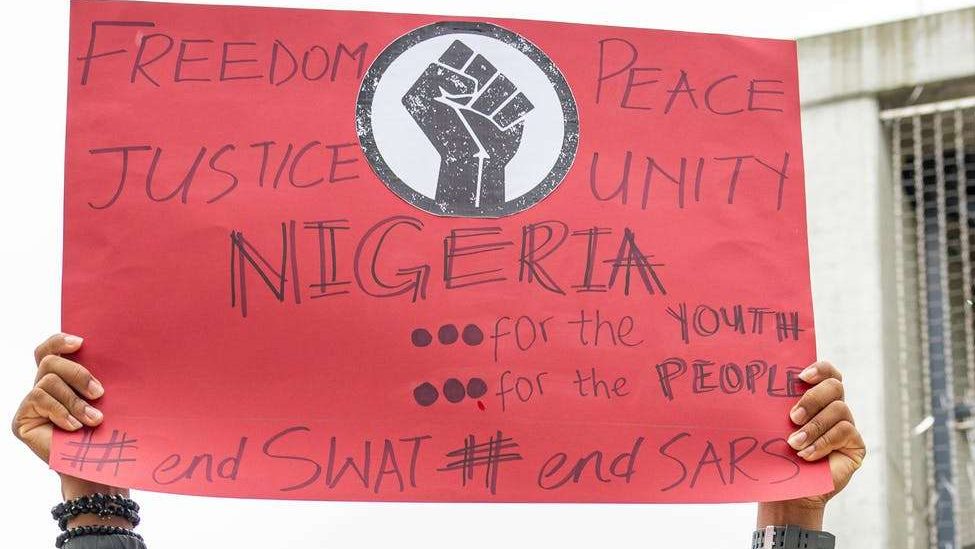Nigeria and the Current #ENDSARS Movement
According to John Locke; if a government fails to fulfill its purpose, then the people have the right to withdraw their allegiance to that government and to remove the government and reinstate a new one. In a democracy, demonstration and social movements are allowed; protest, respect of citizens’ fundamental human rights, rule of law and freedom of speech are to be duly observed. But how do these ideas relate to Nigeria’s Special Anti-Robbery Squad and the #EndSARS movement?
Democracy gives the voter the ultimate power to elect and remove his leader, if inaccuracy was, in one way or the other, measured. Hitherto, when democracy is demoralized and turned into “Demo-crazy” then it might warrant social movement and reformation. Anyone who knows of the French Revolution knows the power of social movements and how it led to the overthrow of the existing status quo.
Law Enforcement Agencies
Law enforcement agencies are meant to protect the lives and property of citizens of the country. They are expected to work within the provisions of the law; to work in accordance to the law and respect their jurisdiction. But if, after crossing their jurisdictions of operation according to the modus operandi of the law, still necessitate and to gross disrespect to the constitution perpetrate crimes which negates the existence of the human and his fundamental rights as a citizen.
Crimes such as: robbery and the violation of the human rights and harassment and extortion and gross misconduct and extra-judicial killings, do not only serve as a breach of their functions as security operatives who should curtail all forms of criminality and public disorder in the society but also as a clarion call for reformation through protest. All democratic government personnel are expected, as provided by the rule of law and the extension of constitutionalism, to respect and heed the voices of the masses who elected them into their designated political offices.
Special Anti-Robbery Squad (SARS)
The ‘Special Anti-Robbery Squad’ (SARS), is a dreaded anti-crime unit of the Nigeria Police Force founded in 1992 by Simeon Danladi Midenda, a retired Commissioner of Police who added the word ‘’Special’’ to the already existing Anti-Robbery Squad which became the ‘Special Anti-Robbery Squad’ (SARS). That was how the name SARS came into the Nigerian Police vocabulary (Nnadozie, 2017).
Simeon Danladi Midenda was the Nigerian Contingent Commander to United Nations Mission in Bosnia and Herzegovina in 1998. According to Spokesman of the Police Force, Jimoh Moshood: SARS is one of the 14 units under the Nigeria Police Criminal Investigation and Intelligence Department which was created to arrest, investigate and prosecute people involved in violent crimes such as armed robberies, murders, kidnappings, hired assassinations and other forms of extreme criminality (Okogba, 2017).
What is going on with the Special Anti-Robbery Squad?
Anti-Robbery, as a modus operandi of the Nigeria Police Force for combating armed robbery, is as old as the police force itself. As a unit, anti-robbery had always existed in all Criminal Investigation Departments at Force Headquarters, Zonal and State Command levels. The major incident that prompted the creation of SARS was when Col. Rindam, a military officer from Plateau State met his death at the hands of police operatives at a checkpoint in Lagos.
Upon discovery, the army took to the streets of Lagos, Nigeria, in search of policemen. As a result, policemen abandoned the streets in Lagos and withdrew to barracks. Robbers then had a field day in Lagos, operating with impunity. It took two weeks of talks before the military and police authorities succeeded in convincing the army chaps to return to barracks and for the police to come back to the roads.
By that time, it was too late. Armed robbers were in control in Lagos and the like of Shina Rambo could not be challenged by any force (Nnadozie, 2017). There is no doubt policing is a complex job all over the world and this is because every action the police personnel takes at any point in time attracts different interpretations from different people.
Duties of the Special Anti-robbery Squad (SARS)
However, the duties of the Special Anti-robbery Squad (SARS) are:
- To reduce armed-robbery that has become so rampant in our today-society.
- To deal with crimes associated to armed robbery, car snatching, kidnapping, cattle rustling, and crimes associated to fire arms.
- To secure lives and properties, prevent, detect crimes and apprehend offenders.
Over the years, the SARS have assisted in curbing various crimes in the country such as the two notorious armed robbers terrorizing and robbing residents of Ire Akari street, Ejigbo and Isolo areas in Lagos, snatching and vandalizing vehicles in the area for long. They were arrested by operatives of the Special Anti-Robbery Squad (SARS) in Adeniji Adele Road, Lagos Island. This, no doubt, brought a temporary sigh of relief to residence of the area.
Continued History of SARS
Also, in 2015, due to the unabated activities of cultists and other violent crimes, including kidnapping and armed robbery in Edo State, the Inspector General of Police (IGP) Idris, dispatched a special crack squad comprising SARS officers to the state to tackle the situation.
The situation was, few days after, brought under control. As record has it, SARS has been able to arrest more than three thousand kidnappers across the country and, in fact, the recent successes recorded in reducing the high rate of crime and criminality, especially kidnapping and other deadly vices in most parts of the country, is due to the SARS operatives.
The arrest of the notorious kidnappers that terrorized the country for more than six years, popularly known as Henry Chibueze (Vampire) and Onwumadike Chukwudumeme (Evans), was achieved following the ingenuity and gallantry displayed by the SARS unit of the Force (Muhammad, 2017).
Police Violence
To the biography of the SARS operative in curbing crime are also veritable claims against their barbaric and misuse of force and perpetual extra-judicial killings directed towards the civilian population. Just as there can be no perfect institution or person, it is undeniable that this security operative continually crosses their boundary of operation. The SARS, as we have today, has portrayed another definition of what they stand for, and their self-portrayal has brought distaste and horror to the society.
They are now controlled majorly by those who are financially buoyant enough to tilt their throttle, which is mostly directed towards unjustified arrests and harass and where to raid, which inevitably depletes the activeness of the operative towards the pursuit of the aims set before them. These genetic restructuring have directed their rifles towards the civilian wearing a starched shirt, flashy wrist-watch, an iPhone, or combined with a car, without being harassed and extorted.
Special Anti-Robbery Squad and Present Nigeria
In present Nigeria, a high standard of living is a bull’s eye for the SARS, especially for a youth. When you are a youth and you do all these things, they see you as either a fraudster or cyber-criminal, in the forgetfulness that some youths really do live fine with their businesses. There is little or no chance of escape when seen and caught as a criminal by these security operatives, at least not without paying a ‘small change for wellbeing,’ and if not adhered to, the caught runs the risk of being shot and jailed and robbed and framed up.
However, fighting fraudsters in Nigeria, and indeed in the world, is a very important thing to do—but it’s never the duty of SARS. There are other security agencies like the Economic and Financial Crime Commission (EFCC), or the Independent Corrupt Practices Commission and other related offences (ICPC) that could take up that function if supported by the law.
These SARS stay mostly in states with 4G networks like Lagos, Delta, Edo, Imo and so on. The SARS operatives stay mostly such states to harass, extort and deprive people especially the youths of their hard earned money and property, and even to the extent of engaging in armed-robbery, corruption, extortion and extrajudicial killings.
Amnesty International
In September 2016, Amnesty International (AI) followed in the trail of widespread complaints by citizens and published a report accusing the Squad of subjecting its detainees to horrific torture in form of hangings, beatings, humiliation, shootings, mock executions, and extortion (Vanguard, December 6, 2017).
SARS is a special arm of the Nigeria police force created to combat violent crimes. The group has however, become a societal menace, perpetrating the very act it was created to stop. SARS officers have been accused of armed robbery, extortions, assaults and murders. There have been many accounts of criminality.
Accounts of Criminality
In 2019, Kolade Johnson was shot by officers with Nigeria’s anti-cultism police unit during a raid in Lagos, according to a statement from the Nigerian Police Force. Members of the unit were searching for a suspect and at one point fired into the air. Johnson and a friend were leaving a soccer viewing centre in the area, where they had gone to watch a Premiership League match, when a stray bullet hit and killed him. He died at the hospital while waiting for treatment. But more Nigerians have been victims before and after him.
On the 21st of August 2019, four SARS operatives were arrested and charged with murder after being caught on film manhandling and then shooting to death two suspected phone thieves in broad daylight. The two suspected phone thieves were shot dead after they had been arrested without questioning.
On the 5th of September 2019, operatives of the special Anti-robbery squad in Lekki, Lagos allegedly kidnapped, tortured and robbed Nigerian rapper Ikechukwu Onunaku. According to a publication by punch Nigeria, the rapper was forcefully made to make several withdrawals at the ATM to pay SARS operatives for committing no crime.
#EndSARS Movement in Nigeria
A social movement started in Nigeria on “Nigerian Twitter” and streets in states all over the country opposing the Anti-Robbery squad, a unit of the Nigerian Police Force. It is a call to end police oppression and brutality in Nigeria. The protests started as a social media campaign using the hashtag #ENDSARS to demand Nigeria’s government to scrap and end the deployment of Nigeria Police Force Special Anti-Robbery Squad, popularly known as SARS.
Nigeria have shared both stories and video evidence of how members of the SARS engaged in kidnapping, murder, theft, rape, torture, unlawful arrests, high-handedness, humiliation, unlawful detention, extrajudicial killings, and extortion.
History of #EndSARS Movement in Nigeria
They’ve been a campaign of this sort earlier in the year 2020 which moved for the disbandment of SARS. On Saturday 3rd October 2020, a video started trending on social media showing a SARS police officer shooting a young Nigerian at the front of Wetland Hotel, Ughelli, Delta State. It was alleged that the police officers took away the young man’s vehicle, a Lexus SUV. This caused an uproar on social media and protesters moved to the streets in protest against police brutality.
This took place in some respective states in the country like Abuja, Lagos, Ibadan, Osun, Benin, Delta, Ilorin, Ogbomosho etc. This protest gathered lots of momentum which led to various celebrities and music artists such as, Wizkid, Davido, Falz, Naira Marley, Run town etc, to protest on social media and even to the street of Abuja, Lagos and London. This protest got solidarity from various foreign celebrities across the country such as Drake, Cardi B, Kanye West, etc.
Hitherto, this peaceful protest was a call for the disbandment of the SARS in totality. The citizens are tired of the extrajudicial killings, extortion, corruption etc, perpetrated by the very people who are meant to protect them. They came out to protest and fight for their own right as enshrined in the Nigerian constitution. Like the functionalist sociologists emphasize holism, so do the people demand a total reformation of the Law Enforcement Agencies in Nigeria.
Final Thoughts on Special Anti-Robbery Squad in Nigeria
The government after seeing the protest, ordered the IGP in Nigeria on 11th October, 2020 to disband the SARS police unit.
In conclusion, it’s alleged that some of the SARS officers are ex-convicts and criminals who lack sympathy for humans as they kill anyhow, arrest without warrant. They lack social, psychological orientation and the handicapped legal system has made them feel like they are above the law; corruption and the poor understanding of the law tend to affect their activities. To curb this menace, the police officers during recruitment, training and after training and recruitment should be trained psychologically, undergo studies in liberal courses like Sociology, Criminology, Psychology, Law and Political science.







